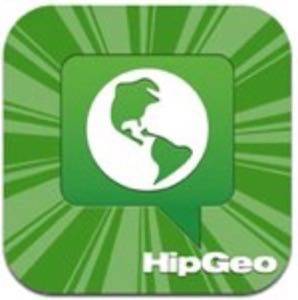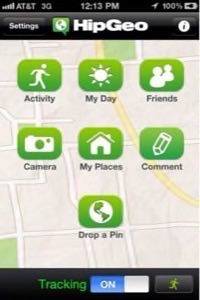HipGeo, a location based social network that I wrote about in February, started and invested in by a group of Yahoo veterans and advised by a team of corporate data rockstars, has launched its iPhone app and it’s really impressive. I’m having some performance issues with it but the potential is clear and the user experience is strong.

The app tracks your travels, then stitches together your photos, comments and pinned locations into an animated diary of each day. It lets you roll back time to see what you did on any day in the past and offers other sophisticated features in a beautifully designed interface with a well thought-out user experience. The company’s launch was quiet, but if they can amplify their marketing I think HipGeo is something that will appeal a lot to many people. The startup said it was going to build a “Mint.com for your location” and this first version of the app looks like it’s well on its way to delivering on that promise.
The HipGeo team is remarkable. It includes former Yahoo execs Scott Daniel, Jeff Kunzelman and Rich Rygg. Advisors include very early Yahoo engineer and former Chief Technology Evangelist Ash Patel (who invested), CitySearch co-founder and CEO Charles Conn and eHarmony Chief Scientist and former Kaiser Permanente Research Director Galen Buckwalter, Ph.D. (who also invested). A team like that should be well positioned to advise on data, user psychology and location.
What the team has built is remarkable, too. Almost every screen in the app impressed me with the thoughtfulness of the features, the privacy settings and the sharing capabilities. Even if you don’t want to use it on a regular basis, it’s worth downloading the free app just to see how it was all put together.

When I wrote about the company in February, co-founder Rich Rygg told me that HipGeo would offer all kinds of information about the places you go, pulled from various sources online like Wikipedia, Twitter and elsewhere. That’s not in the app at launch. I hope it will be later, but I wouldn’t be shocked if the team thought that their existing features are complex enough that they didn’t need more.
There is enough going on that it will be interesting to see if the user experience resonates as well with users as it does with me. Do people want to create a daily diary of where they go and what they do? Do they want to watch the navigation around town of their friends? Maybe, we’ll see. I would like that. See also GeoLoqi.
HipGeo still feels a little early. I’m testing it in the urban canyon of New York City where data connections are terrible so it’s hard to know how performance will be in other locations.
The quantified self, mobile devices as sensors, location as a platform: all of those are trends that HipGeo is trying to tap into. What they’ve launched is a strong first effort.

















